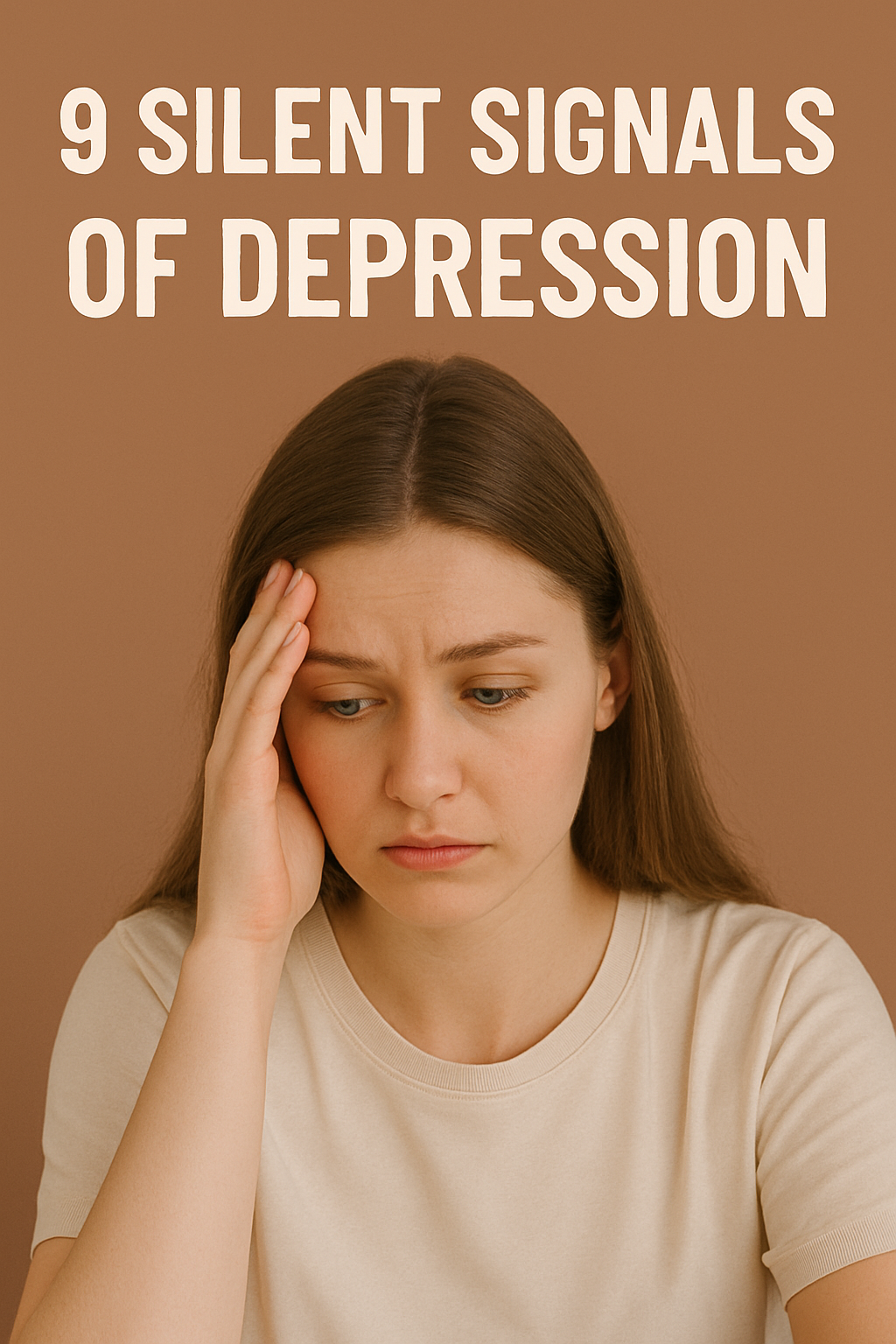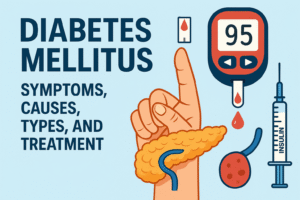9 Silent Signals of Depression

Depression is more than feeling sad now and then—it can slowly creep into everyday life, eroding energy, motivation, and hope. While everyone experiences some low moments, depression sticks around longer, colors most things with heaviness, and often stays hidden behind forced smiles. Recognizing the signs early can make a big difference in finding help and healing.
If you or someone you care about seems off lately, look out for these nine common—but often overlooked—clues:
1. Persistent Sadness or Hopelessness
We all feel sad sometimes. But when the sadness doesn’t ebb and instead lingers for weeks or even months, it crosses a more serious line. Common indicators include:
- Waking up feeling heaviness or dread, not anticipation.
- A pervasive hopelessness—feeling like nothing will ever get better.
- Searching for excuses to stay in bed or blankly staring at the wall.
This sense of emotional numbness often looks like dark clouds that won’t clear.
2. Loss of Interest or Pleasure (Anhedonia)
Take notice if once‑loved activities—reading, spending time with friends, favorite hobbies—no longer spark joy. Signs of anhedonia include:
- Cancelling plans more often.
- Losing your appetite for things that used to feel meaningful.
- Feeling bored or detached even amid exciting events.
It isn’t laziness—it’s an emotional shutdown where motivation and pleasure no longer register.
3. Changes in Sleep Patterns
Depression often throws sleep out of whack—either way.
a) Insomnia:
Struggling to fall asleep, waking up in the early morning hours, or lying in bed wide awake with anxious thoughts.
b) Hypersomnia:
Oversleeping, feeling exhausted even after a full night’s rest, or napping excessively to escape the day.
Watch for a sudden shift in your usual sleep habits for clues.
4. Appetite or Weight Fluctuations
Food and mood are closely connected. Depression can trigger:
- A complete loss of appetite, neglecting meals.
- Emotional or binge eating of comfort foods.
- A significant weight loss or gain when nothing else has changed.
These food-related changes may seem physical but often reflect emotional distress.
5. Persistent Fatigue or Low Energy
Feeling heavy, sluggish, exhausted—like wading through molasses—can be draining. This kind of fatigue isn’t fixed by rest or coffee. If daily tasks feel monumental, or you need naps just to get through afternoon meetings, it’s more than being tired—it can be depression sapping your strength.
6. Irritability, Agitation, or Restlessness
Not everyone with depression appears sad. Some show it as:
- Irritability—snapping at others over small matters.
- Agitation—unable to sit still, pacing, wringing hands.
- Feeling on-edge, impatient, or easily frustrated.
These signs are especially common in teens and men, who may express emotional pain as anger or restlessness.
7. Difficulty Concentrating or Making Decisions
Depression can fog the mind. Notice how often you:
- Struggle with tasks you once found easy—like reading, watching a show, or focusing at work.
- Feel indecisive over simple choices—what to order, what to wear.
- Frequently repeat or re-check things—like rereading a sentence or reopening an email to ensure it’s perfect.
This brain-fog isn’t personal; it’s a symptom.
8. Thoughts of Worthlessness or Excessive Guilt
Depression breeds self-criticism. You may notice:
- Negative self-talk—”I’m worthless,” “I’m a burden.”
- Excessive guilt over past mistakes or normal life choices.
- Feeling undeserving of kindness, love, or happiness.
This ongoing shame or self-blame—especially when unfair or exaggerated—is a red flag.
9. Thoughts of Death, Self‑Harm, or Suicide
These are the most serious signals—silent cries for help:
- Recurring thoughts like “I wish I weren’t here.”
- Fantasies about suicide, planning, or preparing for self-harm.
- Talking about being hopeless or wanting to “end it all.”
These must be taken very seriously. If you or someone else is experiencing suicidal thoughts or behaviors, reach out immediately—to a trusted friend, family member, mental health professional, or emergency service. You are not alone, and support is available.
When Depression Doesn’t Look ‘Depressed’
Remember:
- High‑functioning depression means people may “appear fine” externally but feel numb, exhausted internally.
- Masked depression often expresses as physical pain—headaches, digestive issues, chronic aches—with no physical cause.
- Adolescents and men may not cry often but might show anger, irritability, or risky behavior.
Depression doesn’t have one look. It hides behind smiles, routines, and even success.
What You Can Do
1. Reach Out for Support
Depression thrives in silence. Find someone safe to talk to—friend, family, coworker, mentor—someone who listens without judging. Saying “I’m not okay” can break an invisible dam.
2. Seek Professional Help
Therapists, psychiatrists, and counselors are trained to understand depression and guide you back to balance. Therapy and/or medications (like SSRIs) can make a real difference.
3. Try Small, Manageable Steps
Schedule short, daily routines—even a 5-minute walk, a poem, a single hobby.
Celebrate tiny wins—getting out of bed, finishing a shower, cooking your first meal of the day.
Momentum grows from consistency, not perfection.
4. Prioritize Sleep, Movement, Nutrition
Go to bed and wake up at the same time.
Move your body—even a brief stroll or stretching session.
Eat simple, balanced meals—vegetables, whole grains, protein, water.
Your brain and body are deeply connected.
5. Avoid Self‑Isolation
Isolation deepens depression. Call a friend, visit public spaces, or even sit in a café. Join support groups—online or in person—for shared understanding and belonging.
6. Practice Self‑Compassion
Depression distorts self-view. Consciously replace harsh self-talk with supportive thoughts. Talk to yourself like you would to a loved one. Over time, you can shift the mindset from “I failed” to “I’m struggling, but I’m trying.”
If You Recognize These Signs in Yourself…
- Talk to someone you trust. You don’t have to explain everything—just say, “I’m not okay.”
- Contact a mental health professional: counselor, therapist, psychologist, psychiatrist.
- Use emergency resources: If you feel actively suicidal, don’t wait—call your local emergency number (e.g., 112 in India) or a crisis line like the AASRA helpline (24/7, India): 91‑22‑27546669.
You’re not alone. Many have walked this path and found their way to hope.
If You Notice These Signs in Someone You Care About…
- Reach out gently: “I’ve noticed you seem different—are you okay?”
- Listen with patience and without judgment.
- Encourage them to see a professional—offer to help find one or accompany them.
- Keep checking in—depression recovery is rarely linear, and knowing they’re not alone matters.






